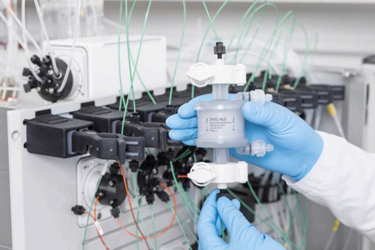Sartobind® Rapid A: Proven, Scalable New Membrane Platform For mAB Capture

Monoclonal antibodies (mAbs) are among the most successful biotherapeutics and are known for a wide range of medical applications, including cancer treatment. In terms of mAb production, protein A based affinity chromatography is the established product capture step in downstream processing. This type of purification relies on the specific affinity interaction between the antibody’s Fc-region and an immobilized protein A (ProtA) ligand on the surface of a chromatographic material.
Today, a variety of chromatographic materials are available on the market: resins, membranes, fibers, and monoliths. Most manufacturers choose resins because of their high binding capacities and robustness, and because they can draw upon years of experience working with the material. Unfortunately, resins have a high residence time due to long diffusive pathways, leading to low productivity. By contrast, purely convective materials — e.g., membranes, fiber-beds or monoliths — offer increased productivity as they do not suffer from diffusive mass transport limitations.
Discover the convecdiff Sartobind® Rapid A membrane, a new type of chromatographic material that combines high protein binding capacity with high productivity while providing scalability. The new membrane was tested in three different device sizes featuring different membrane volumes. Results show the material is comparable to the performance of established materials and well-suited for protein bind-and-elute applications ranging from laboratory to production scale. Explore performance data of the Sartobind® Rapid A membrane measuring its yield, impurity reduction, and other factors.
Get unlimited access to:
Enter your credentials below to log in. Not yet a member of Pharmaceutical Online? Subscribe today.
